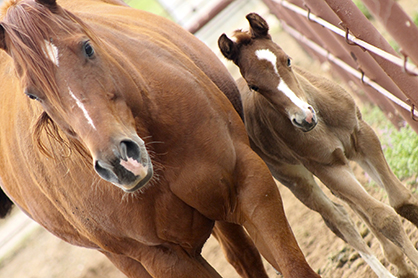Fecal Liquid Syndrome- Can it be Solved?

By: Juliet M. Getty, Ph.D
“Fecal Liquid” or sometimes referred to as “Fecal Liquid Syndrome” is very difficult to deal with. It is characterized by normal manure, followed by a stream of liquid. It is messy, irritating to your horse’s skin, and hard to clean up, especially when the weather is cold.
While the exact cause is not clear, it appears to be caused by some form of stress, particularly social stressors such as changes in living arrangements, introduction to new horses, excessive travel, or the loss of a close buddy. Changes in turnout or exercise schedules can exacerbate digestive disturbances, as can abruptly changing the diet, whether it be a new hay, commercial feed, or supplement.
Ulcers can also lead to this condition, so it is important to rule those out and take measures to prevent ulcers such as 24/7 access to forage, and room to roam.[1]
But in all these situations, the underlying problem is inflammation within the hindgut. The cure may be sodium butyrate.
Sodium butyrate, also known as “butyric acid,” is not new to the horse. In fact, your horse produces it daily as a product of fiber digestion, along with two other volatile fatty acids (VFAs), propionic and acetic acids. Together, these three VFAs provide energy to the horse’s cells. When butyric acid is added as a supplement,[2] it can help maintain a healthy intestinal mucosal lining by reducing inflammatory molecules known as cytokines and providing energy for intestinal cells.
Sodium butyrate does more than reduce fecal liquid.[3] It makes the horse healthier by combating harmful changes in the microbiome that can lead to reduced immune function, poor performance, irritable behavior, and even the inability to gain weight. Butyric acid also helps the insulin resistant horse through its ability to increase hormones that work toward keeping blood sugar levels stable.
When supplementing it, always start with a “pinch” to allow the horse to become accustomed to the new taste, which can smell somewhat like soured milk. Just a little bit of trivia… butter is high in butyric acid, hence the name. But it is not recommended that you feed butter to your horse!
Bottom line
Sodium butyrate is beneficial for any digestive disturbance, but the one that seems to cause the most frustration is fecal liquid. By nourishing the intestinal cells, and reducing inflammation, you are highly likely to have a much more comfortable horse.
References
[1] Getty, J.M. Don’t let your horse develop an ulcer. https://gettyequinenutrition.com/pages/dont-let-your-horse-develop-an-ulcer
[2] Microbiome Support (Equi-Force) is available at Dr. Getty’s Free Shipping Store: https://gettyequinenutrition.com/pages/free-shipping-store
[3] To learn more about sodium butyrate, read Dr. Amy Gill’s work: https://www.equiforce.com/gut-buster-sodium-butyrate-which-the-horse-naturally-produces-is-proving-to-be-an-exceptional-nutritional-therapy-for-colon-health-in-the-equine-when-added-at-a-therapeutic-dose-to-the-diet/
Juliet M. Getty, Ph.D. is an independent equine nutritionist with a wide U.S. and international following. Her research-based approach optimizes equine health by aligning physiology and instincts with correct feeding and nutrition practices. Dr. Getty’s goal is to empower the horseperson with the confidence and knowledge to provide the best nutrition for his or her horse’s needs.
Dr. Getty’s fundamental resource book, Feed Your Horse Like a Horse, is available in paperback and Kindle versions. The paperback version is available at https://gettyequinenutrition.com — buy the book there and have it inscribed by the author. Print and Kindle versions are also available at Amazon; find print version at other online retail bookstores. The seven individual volumes in Dr. Getty’s topic-centered “Spotlight on Equine Nutrition” series are available with special package pricing at her website, and also at Amazon in print and Kindle versions. Dr. Getty’s books make ideal gifts for equestrians!
Find a world of useful information for the horseperson at https://gettyequinenutrition.com: Sign up for Dr. Getty’s informative, free e-newsletter, Forage for Thought; browse her resource library of articles and tips; listen to recorded interviews; and purchase recordings of her educational teleseminars and webinars.










